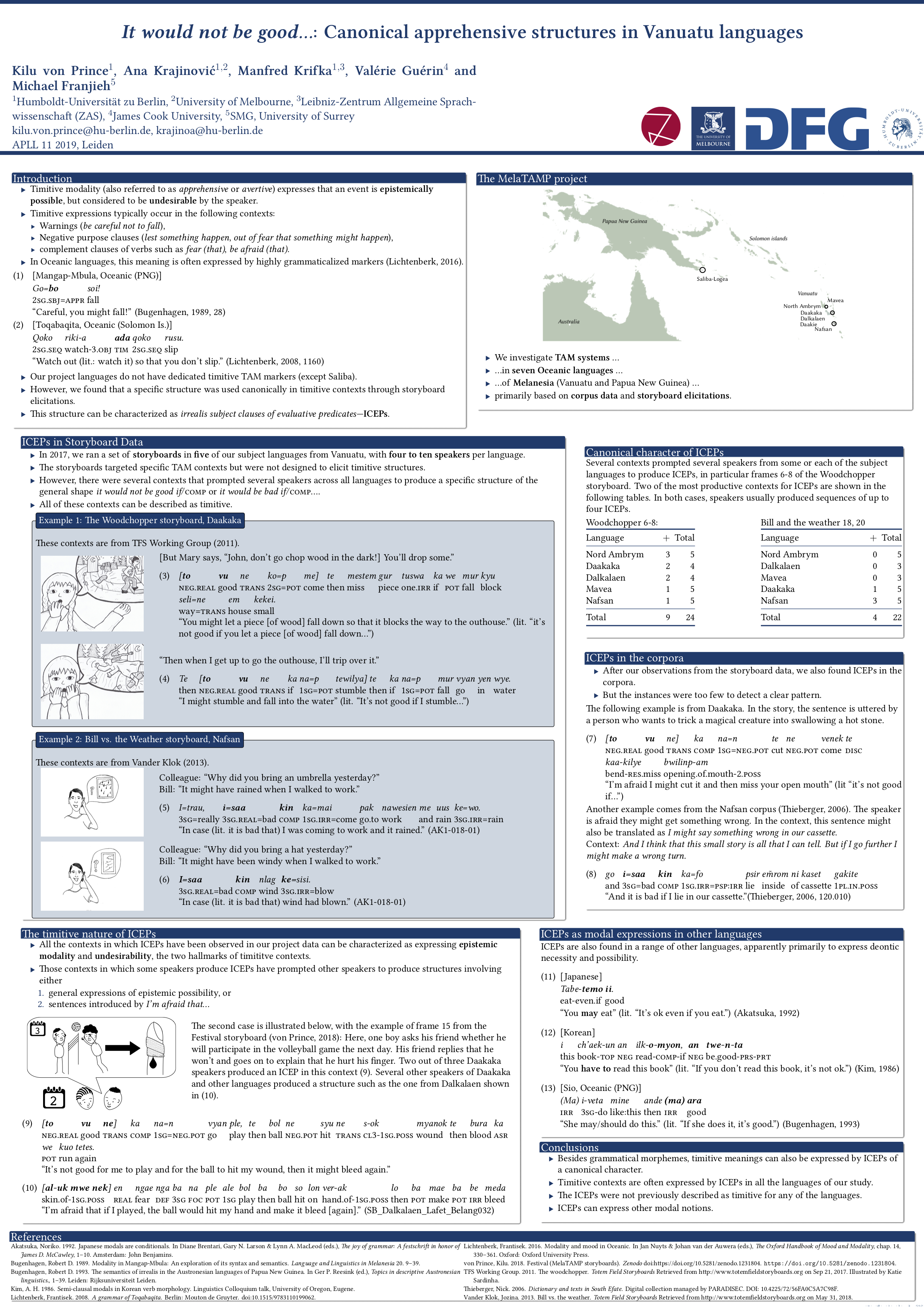 Our paper on how to map the modal-temporal semantics of TAM markers in Oceanic languages empirically is now out in the proceedings of Linguistic Evidence 20.
Our paper on how to map the modal-temporal semantics of TAM markers in Oceanic languages empirically is now out in the proceedings of Linguistic Evidence 20.
News
APLL in Leiden
 My colleagues Ana Krajinović and Manfred Krifka are currently at APLL in Leiden to present our joint work on timitive structures in Oceanic, which have the shape it’s not good/it’s bad if… . Timitive modality is a category often found in Oceanic, which typically occurs in warnings (Watch out, you might fall!) or negative purpose clauses (You should take an umbrella, lest you get wet!). Download the poster here.
My colleagues Ana Krajinović and Manfred Krifka are currently at APLL in Leiden to present our joint work on timitive structures in Oceanic, which have the shape it’s not good/it’s bad if… . Timitive modality is a category often found in Oceanic, which typically occurs in warnings (Watch out, you might fall!) or negative purpose clauses (You should take an umbrella, lest you get wet!). Download the poster here.
Out now: Counterfactuality and Past
My article on counterfactuality and past is out now, and it’s free to access. In 2011, while I was working on the Daakaka grammar, I looked at the system of TAM markers and asked myself how hard it would be to figure out their meanings. Manfred Krifka suggested I start working with branching time to account for the realis/irrealis distinction, which I did. Except that the distinction we find in the Daakaka system isn’t binary, but tripartite.
Continue reading “Out now: Counterfactuality and Past”MelaTAMP at LTC 19 in Poznań
Our project was represented with two papers in this year’s Language and Technology Conference in Poznań. Ana Krajinović presented joined work with colleagues from Vanuatu and Melbourne on community-led language documentation. She won the award for the best student presentation.
Annika Tjuka, in a joined paper with Lena Weißmann and me, presented our tag set for the MelaTAMP corpora with a focus on tagging habitual aspect: the fact that habituality or genericity can be a property of stretches of discourse larger than a sentence makes clause-wise tagging complicated.
Diversity linguistics in Cologne
I’m currently in Cologne at the small Vielfaltslinguistik Conference (Diversity linguistics). It’s great to see so much new and interesting work on lesser described languages. My own talk, on joined work with Manfred Krifka and Ana Krajinović, focuses on empirical methods in our MelaTAMP project. Our slides can be downloaded here: [download id=”473″].
Habituality in four Oceanic languages
Our article (with Ana Krajinović, Anna Margetts, Nick Thieberger and Valérie Guérin) is out now and currently available for free here. In this article, we talk about habitual aspect in four Oceanic languages and demonstrate how it is (or isn’t) typically expressed. Reduplication and imperfective aspect play a particularly prominent role, sometimes in combination with each other.
International Linguistics Olympiad

Germany will participate in this year’s Olympiad of Linguistics in Yongin, Korea, and I am part of the small team of people who are organising the selection and training of the German team. We’ll have two rounds of online tests before inviting the finalists to our Berlin boot camp.
How to revise your article after reviewing
Contents
Opening the mail…
Once you have submitted your article to a research journal, it can take a few weeks to a few months before you hear back. During that time, your editors are busy finding competent and willing reviewers, and hopefully, those reviewers are busy reading your work with discretion and charity and thinking about the best ways to help you improve your manuscript. If you do not hear back from the editors after 3 months, feel free to send them a friendly reminder that you are still waiting for reviews.
Continue reading “How to revise your article after reviewing”
Getting your manuscript ready for its first submission
You have interesting and original research to publish, but you have not done this before, how do you proceed? Here is how I do it.
Continue reading “Getting your manuscript ready for its first submission”
Out now: Proceedings of Sinn und Bedeutung 21
The proceedings for Sinn und Bedeutung 21 is out now and available from here. Check out my article on how to derive the discontinuity implicature of past markers in Daakaka and elsewhere!
